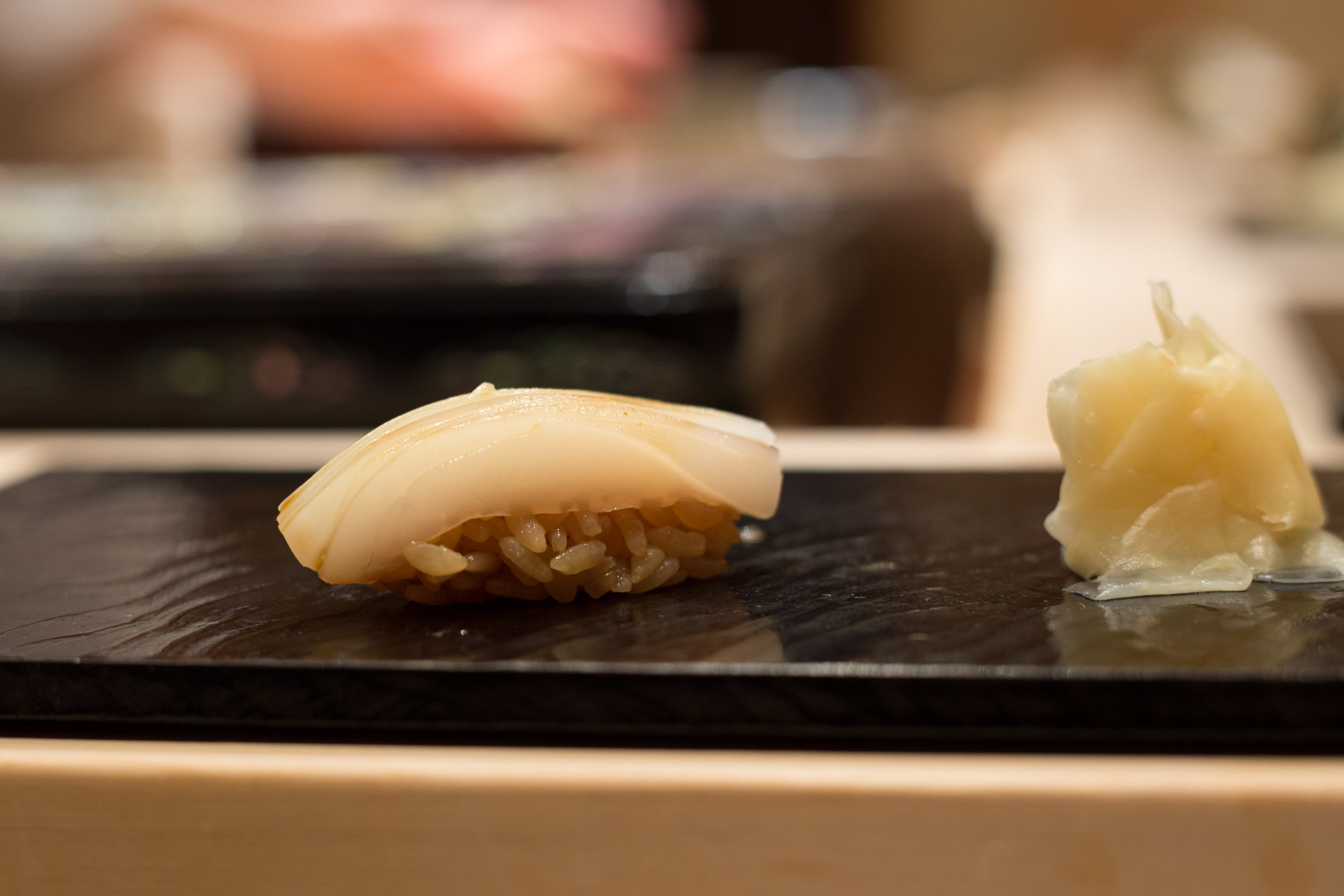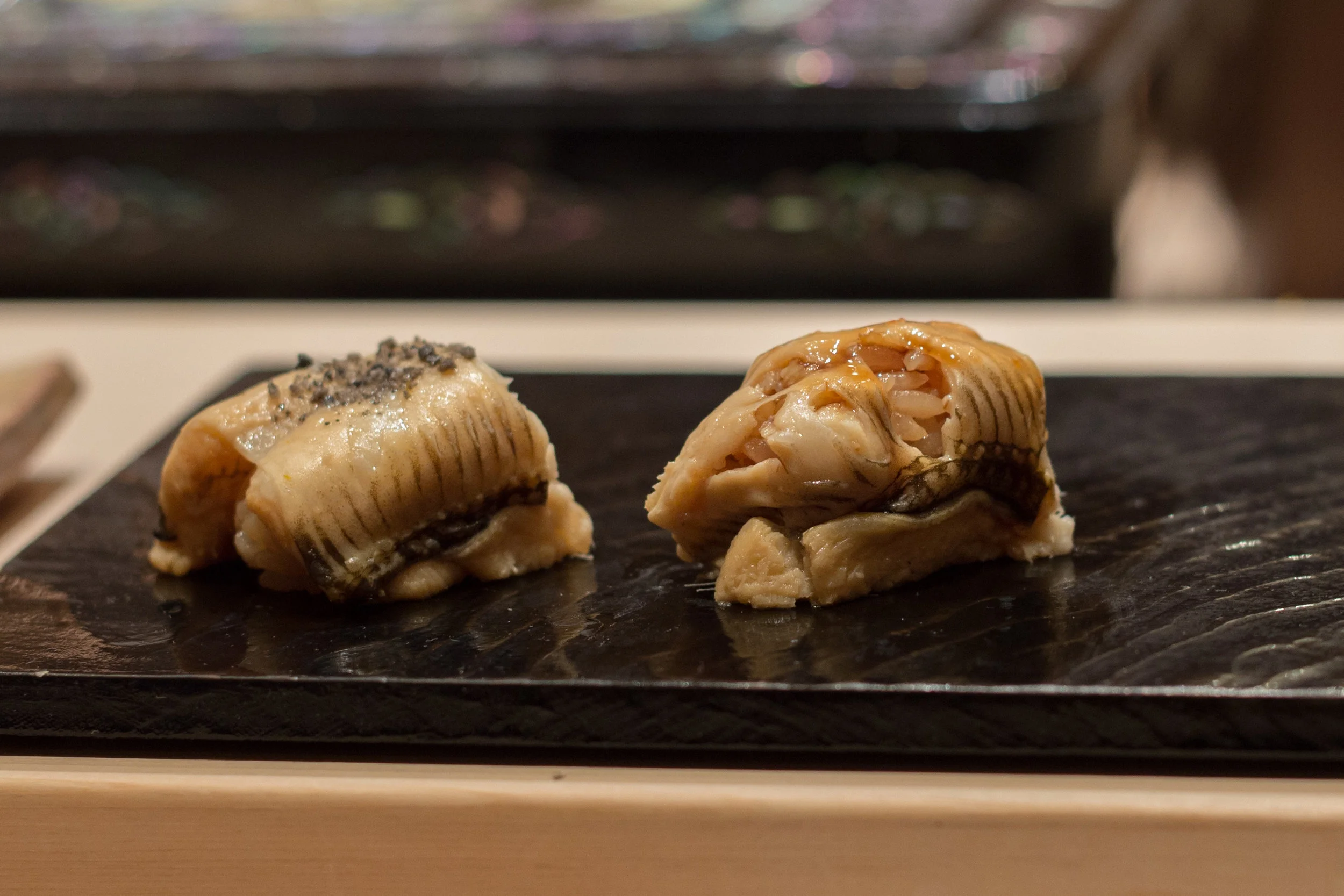Sushi Tokami in Ginza, Tokyo

To follow my delicious lunch at Kyubey, I headed to Sushi Tokami (currently ranked as the #5 best sushiya in Tokyo on Tabelog) for dinner. The restaurant is located in the basement of the Seiwa Silver building in Ginza, not far from Shimbashi station, in the former location of the celebrated Sushi Mizutani. The counter sits ten and is quite comfortable. Tokami's taishō, Hiroyuki Sato, and his staff are all very friendly, and the atmosphere in the shop is lighthearted and pleasant. Sato-san is quite the stand-up comedian and showman and is quick to make his customers feel at ease. About half of the patrons on this visit were foreigners - I'm assuming that Tokami's popularity with foreigners has to do with Sato's English speaking skills as well as Tokami's Michelin star. In any case, this was the only sushiya I visited on this trip where foreigners nearly outnumbered Japanese patrons.
As indicated by their Tabelog ranking, Tokami has gained a very strong following in the three years since the shop's opening. They are renowned for sourcing some of the very best hon-maguro available. How does a new shop manage to source such sought-after tuna? Simple: one of the restaurant's investors is a celebrated Tsukiji tuna wholesaler! This will get you far when hon-maguro is considered the king of all fish.
Tokami is also famous for having strongly seasoned shari (rice). Two types of akazu (sake lees vinegar) are used, rendering the rice brownish in color. The rice seasoning appears to be specifically calibrated to pair well with the tuna. I love rice that is strongly vinegared with akazu, but on this visit I found it to be a little bit too salty, overpowering the flavor of the shiromi and ika tane. However, it worked spectacularly well with the maguro, hikarimono, and shellfish.
As expected, this meal's highlights were the tuna offerings. The maguro trifecta of akami, chu toro and o-toro nigiri were great. The tossaki temaki (a cut from the base of the tuna's head that is very high in flavor) and the tuna bone collagen soup were particular standouts. The collagen soup was maybe the best soup I've ever tasted - it was amazing! Sadly, I was so enthralled by these two items that forgot to take photos.
Other highlights included the aji, the kuruma ebi, and the really delicious tamago. Another superb bite that was not photographed: cold and heated uni served together in a single gunkanmaki. An unorthodox preparation method that is innovative and incredibly tasty. Total cost for this two hour feast, including a couple of beers and a serving of nihonshu: ¥28,685 ($260 US) - not cheap but definitely worth it.
I look forward to visiting Tokami again, but next time I'll go in the late fall or winter when the maguro will be in season and should taste even better!
Below you'll find photos of (almost) all items that were served, in order, along with a few more tasting notes.
Taishō Hiroyuki Sato (foreground) and his second in command (background) behind the counter at Sushi Tokami.
The first plate of tsumami that was served was by far the best. It included awabi (abalone) with its liver and hatsu-gatsuo, aka “first catch” katsuo. Simply amazing! The next few plates of tsumami pictured below, while very good, were not particularly memorable.
Amazing piece of aji - just in season.
Lovely kisu.
Sato's strong shari seasoning works well with the kohada.
Hamaguri - in season and very tasty.
The atmosphere at Tokami is convivial, in no small part due to Sato-san's good sense of humor.
Tokami is known for its maguro, and even tough spring is not the best season for it, the tuna was truly excellent. First up: akami.
Followed by chu-toro. Tokami's strongly seasoned shari paired beautifully with the hon-maguro pieces.
And a great piece of o-toro. The best tuna in the spring typically comes from Sado Island on the west coast of Japan, and I believe this is where this specimen was sourced.
Kuruma ebi is one of my favorite tane and this piece didn't disappoint. Large, juicy, nicely warm. Perfect!
Kasugodai, or baby red snapper, in peak season.
Good sumi ika, although the saltiness of the rice overpowered this piece a little.
The anago served with salt (left) and tsume (right) was very good.
The stellar piece of tamago "brûlée" - Sato-san's tamago is pretty unique and one of my favorite renditions anywhere.
Sushi Tokami
8-2-10 Ginza, Chuo, Tokyo
























